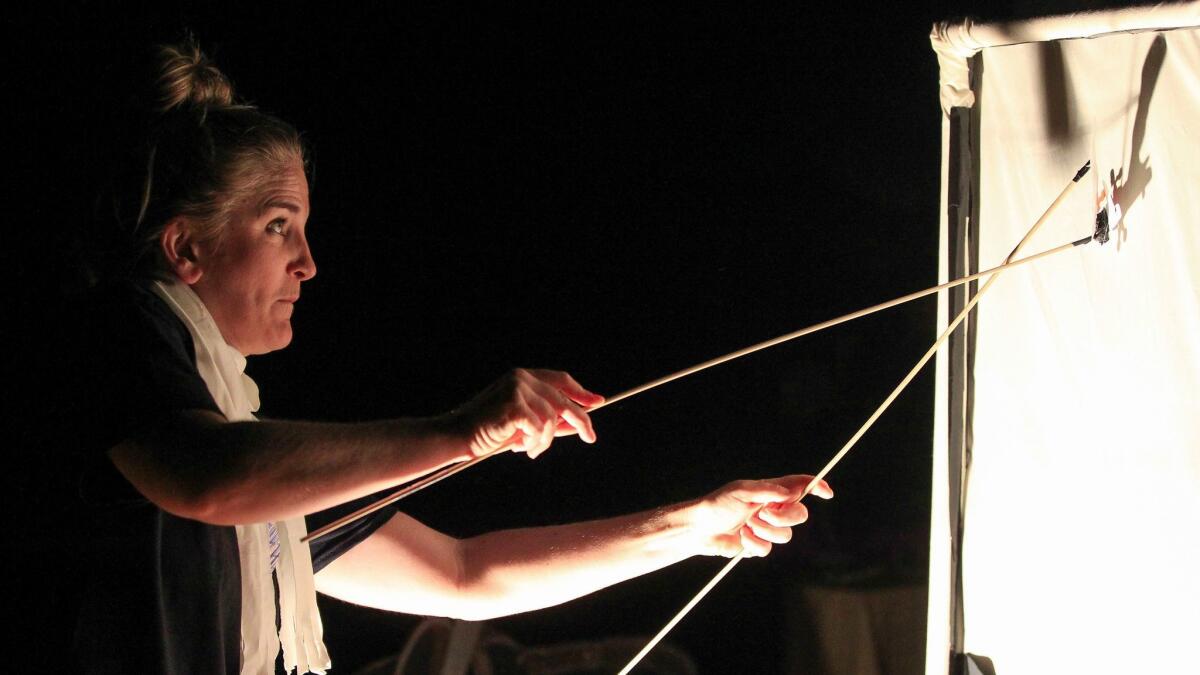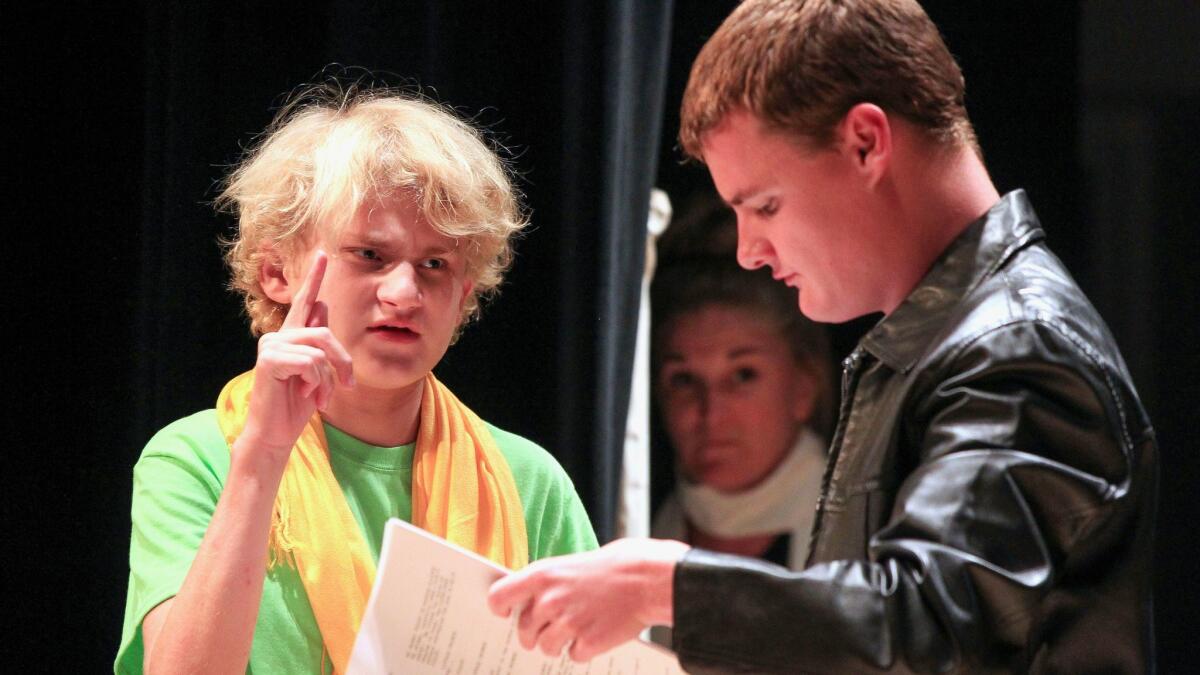Training a spotlight on autism and theater

Kids Act students, peers, and acting mentors participate in Aleta Barthell’s 30-minute “Little Prince” adaptation.
- Share via
On a cool evening in early June, as auditions get under way for the play “Falling,” the conversation onstage is as subdued as the lighting in the intimate “black box” theater.
But as the actors playing a young girl and her grandmother work through a scene, the quiet dialogue between them gives glimpses of a family in turmoil.
In “Falling,” the Deanna Jent play that San Diego’s InnerMission Productions will stage this autumn, that family includes a son named Josh, who has autism. What the character’s sister, Lisa, addresses only glancingly in this scene will be made more explicit elsewhere in the piece: Josh’s fixation on routine, his language difficulties, his fits of aggression.
Lisa sums up the weight of her hurt and heartache with a simple line to her grandmother: “I mostly keep away from him now.”
EDITOR’S NOTE
This is the first in an occasional series that will take a behind-the-scenes look at InnerMission Productions’ “Falling” — a play with a young autistic man at its center — as it progresses from first auditions to the show’s opening in November. U-T theater critic James Hebert, who has a child with autism, also will take a broader look at how theater addresses the condition, and the resources it offers to those with special needs and their families.
When the audition is finished, director Samantha Ginn asks the younger actress a little about her life. It turns out the teen-ager has a twin sister with autism.
So, “I’ve had this conversation,” she says of the dialogue she has just acted out.
And then, in almost the same breath, she says of her sister: “I’m lucky to have her.”
Such a sentiment of fierce but deeply tested love will be plenty familiar to other families with autism in their lives — those doing their level best to embrace the condition and everything that comes with it, both difficult and uplifting.
Theater, too, is grappling with autism, which is now believed to affect about one in 68 American children.
While “Falling” is among the relatively few plays that have explored the condition, or incorporated characters on the wide spectrum of autism, more are being written and produced: “The Curious Incident of the Dog in the Night-Time,” the 2015 Tony Award winner as best play, is probably the best-known example.
But the theater world has embraced those with autism in other ways as well — through productions that get those on the spectrum involved as both audience members and creative partners.

It so happens that in San Diego, “Falling” director Ginn is part of those efforts, too. Her work on local stages is not only helping give the outside world a look at how autism can affect a family, but providing those on the autism spectrum (as well as people with other disabilities) a forum to show how deeply creative they can be.
Ginn, a former special-education preschool teacher, is an in-demand San Diego actor who only recently turned to directing.
The Carlsbad native also runs a program at New Village Arts Theatre called “Monday Night Live!” that pairs teen-agers who have autism and other special needs with “neurotypical” peers to do improv-based theater.
The program, run with educator and theater artist Aleta Barthell’s Kids Act, recently received a grant from the National Foundation for Autism Research both to expand “Monday Night Live!” and to stage an adaptation of “The Little Prince” with special-needs actors.
That show, which was performed earlier this month at the Dove Library’s Schulman Auditorium in Carlsbad (with a funding boost from the city), gave the actors a strong voice in shaping the production.
Its feel was as magical and its spirit as uplifting as that of “Falling” is gritty and realistic. And the show’s whimsical storyline — of visits to various planets where difference is not always understood or appreciated — seemed an inspired fit for the journeys of many of these teens’ real lives.
“A big theme of this play is that the adults are very, very confusing,” says Ginn of Barthell’s 30-minute “Little Prince” adaptation. “That’s what’s so important about the play, is that sometimes we lose our youth and our innocence the older we get. We forget to be kids, and we forget to listen to kids.”

The young people in the production “are very insightful beings,” adds Ginn. (Participants in her program have a range of disabilities, including autism.)
“Sometimes people don’t understand them just because they have a disability or a difference. But they’re extremely intuitive and insightful, and we can learn lessons from them.”
One of Ginn’s favorite quotes from “The Little Prince” is: “Language is the source of misunderstanding.” It’s a line that she says “speaks volumes to this population.”
Above all, she says, the play is “about love, and what we do when we’re in love. Love can get complicated. It’s (the Prince) trying to understand what love is.”
Ginn cites another quote that gets to the heart of the matter: “Love is invisible to the eye. What is essential must be felt through the heart.”
Love above all
A family’s love is likewise at the center of “Falling” — even if those who care so deeply for Josh struggle to get their arms around his autism and its effect on all of their lives.
It’s the kind of story that, as live theater, has the potential to land with particularly vivid impact, and Jent’s play does not spare an audience the more raw aspects of the family’s difficulties.
That was not the whole reason, though, that I found sitting in on auditions for “Falling” a little difficult.
As it happens, I see some of my own family in both of Ginn’s projects. In one case, literally: Both my son, who has autism, and his older sister have been involved in “Monday Night Live!”
And “Falling,” comes uncannily (sometimes uncomfortably) close at times to echoing scenes that have played out in our real lives.
Witnessing those moments enacted onstage is a sharp reminder of how theater can dig at and distill emotions — even those you might be only half-aware of — by reflecting them back at you.
And yet there’s a certain kind of relief in seeing another family confronting the tensions and uncertainties that can be part of life with autism — making mistakes, coping with frustration and worry and faltering hopes, and yet finding ways to move forward.
There’s also a sense of affirmation and appreciation that comes with seeing artists commit themselves to telling a story that they believe matters, and caring enough about it to strive for authenticity — always a major challenge for the non-disabled who are portraying or telling stories about those with disabilities.
After the first round of auditions for “Falling,” Ginn chose the San Diego actor Robert Malave — an InnerMission company member — to take on the difficult role of Josh.
His audition was an impressive one, capturing the feel of mounting distress in a scene where Josh becomes increasingly upset at the prospect of getting on a bus for school.
“I was very iffy about even auditioning for the part, because I was so worried whether I could do it justice,” Malave said, several weeks after the audition. “There are so many things you have to balance.
“As an actor playing any role, you want to balance what people think this is, vs. the reality of it. Trying to make sure I’m actually doing justice to a spectrum of people — but also really representing someone who’s low-functioning — presents even more of a challenge.”
He adds: “There’s nothing glamorous about this character or this show,” alluding to the the kinds of savant talents showcased in something like the Hollywood movie “Rain Man.” And yet “there are joyful things and there’s definitely love and there’s a lot of effort and passion.”
In that vein, what Ginn said of the “Little Prince” project seems as though it could apply equally to “Falling”:
“Sometimes people stay away from this kind of art because it might be challenging, or they might not understand it. But I encourage people to embrace it, and take the challenge.”
Further exploration
Here’s additional information on the projects discussed in this story. As the series progresses we’ll offer details on other resources, including sensory-friendly theater productions. We also welcome our readers’ insights and suggestions.
“Monday Night Live!”: The improv program, offered through New Village Arts Theatre and Kids Act, puts teens who have disabilities together with theater peers and teaching artists. New Village Arts is at 2787 State St. in downtown Carlsbad; (760) 433-3245 or newvillagearts.org/mondays-with-sammy.
“Falling”: InnerMission will present the San Diego premiere of Deanna Jent’s drama about a family with an autistic son. The show runs Nov. 10-26 at Diversionary Theatre’s Black Box, 4545 Park Blvd. in University Heights; 619-324-8970 or innermissionproductions.org.
Twitter: @jimhebert
More to Read
The biggest entertainment stories
Get our big stories about Hollywood, film, television, music, arts, culture and more right in your inbox as soon as they publish.
You may occasionally receive promotional content from the Los Angeles Times.











